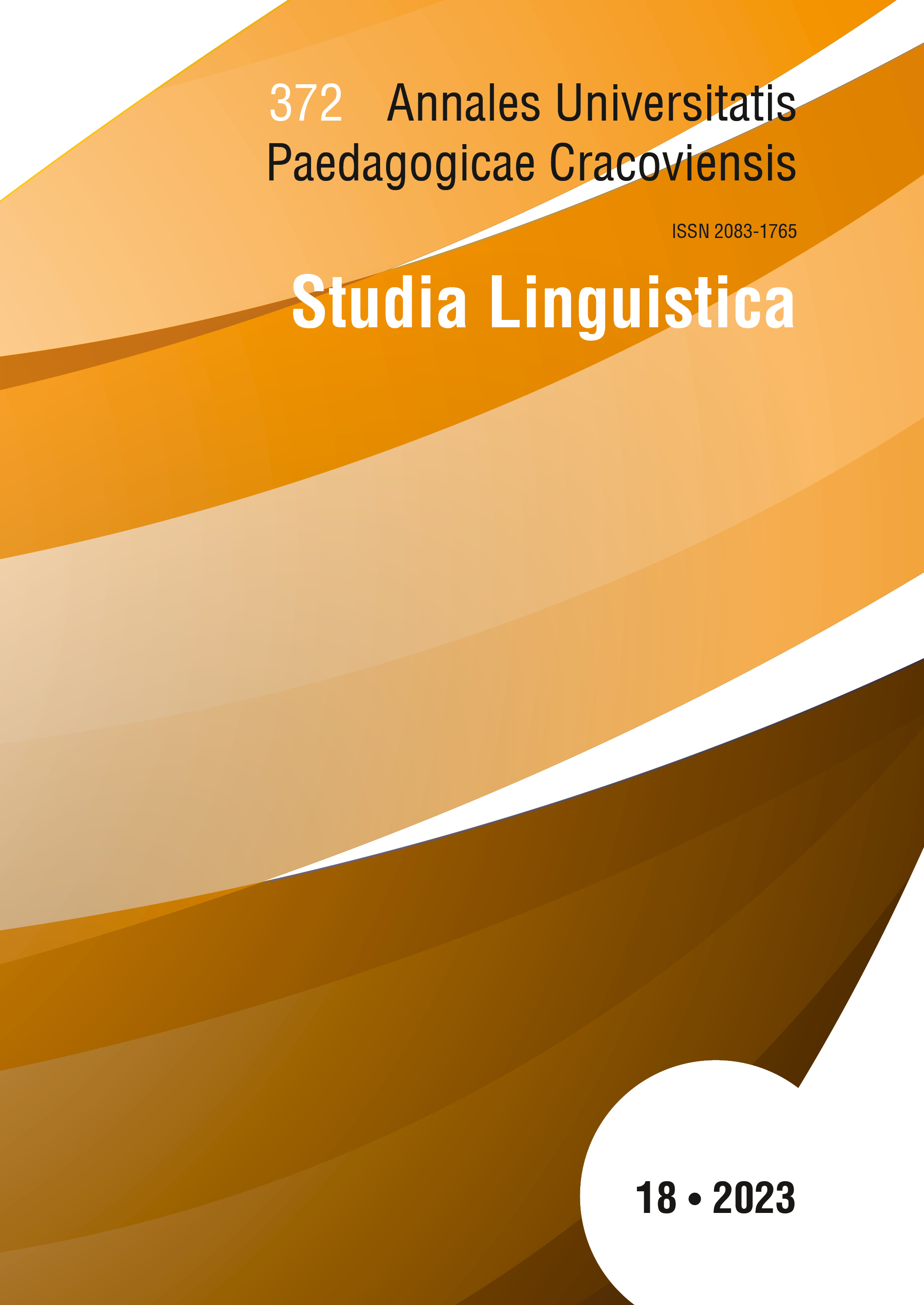A new perspective on firmonyms – Mikołaj Rej’s contribution to contemporary onomastics. Patryk Borowiak, Polskie i bułgarskie firmonimy w perspektywie komunikacyjno‑wizualnej, Wydawnictwo Naukowe UAM, Poznań 2021, pp. 288
Main Article Content
Abstract
none
Downloads
Article Details

This work is licensed under a Creative Commons Attribution-NonCommercial-NoDerivatives 4.0 International License.
Author, submitting a text to the editorial board of the journal “Annales Universitatis Paedagogicae Cracoviensis. Studia Linguistica", certifies that the content of the article has not been published so far and that the work does not violate in any way the copyright or related rights of other person, as well as other rights of third parties, and that no one's rights to the work (or any part thereof) have been missed. After signing the contract, the property rights to the published materials are transferred to the University of the National Education Commission, Krakow.
“Annales Universitatis Paedagogicae Cracoviensis. Studia Linguistica” is an open access journal, and all its content is made available free of charge to users and institutions under the Creative Commons CC-BY-NC-ND 4.0 license (attribution, non-commercial use, no derivative works). Under this license, the authors agree that their work may be lawfully reused for any purpose, except for commercial purposes, without the prior consent of the author or publisher. Everyone can read, download, copy, print, distribute and process these works, provided that the author's marking and the original publication place are correct. Published texts may not be used to create derivative works (e.g. to translate and publish in another language without the consent of the publisher). This is in line with the BOAI (Budapest Open Access Initiative) definition. "Studia Linguistica" does not charge for submitting or processing articles.
References
Dombrowski A., 2015, Nazwy wrocławskich restauracji jako przykład urbochrematonimów: analiza semantyczna, „Językoznawstwo: współczesne badania, problemy i analizy językoznawcze”, nr 9, s. 31–41.
Google Scholar
Gałkowski A., 2011, Chrematonimia w funkcji kulturowo‑użytkowej. Onomastyczne studium porównawcze na materiale polskim, włoskim, francuskim, Łódź.
Google Scholar
Graf M., 2015, Literackie nie‑nazywanie. Onomastykon polskiej prozy współczesnej, Poznań.
Google Scholar
Młynarczyk E., 2016, Modne nazwy firmowe na przykładzie nazw salonów kosmetycznych, „Poznańskie Spotkania Językoznawcze. Kultura komunikacji językowej. Kultura komunikacji w językach słowiańskich – co nas łączy, co różni, co dziwi”, nr 32, s. 117–125.
Google Scholar
Przybylska R., 1992, O współczesnych nazwach firm, „Język Polski” LXXII, z. 2–3, s. 138–151.
Google Scholar
Rutkiewicz‑Hanczewska M., 2013, Genologia onimiczna. Nazwa własna w płaszczyźnie motywacyjno‑komunikatywnej, Poznań.
Google Scholar
Rutkiewicz‑Hanczewska M., 2014, Moda w zakresie morfologii współczesnych emporionimów, „Poznańskie Spotkania Językoznawcze. Przestrzenie językoznawstwa. Prace dedykowane profesor Irenie Sarnowskiej‑Giefing”, nr 27, s. 135–144.
Google Scholar
Rzetelska‑Feleszko E., 1998, Obecne nazwy firmowe w Polsce i w Europie, „Onomastica” XLIII, s. 267–281.
Google Scholar
Rzetelska‑Feleszko E., 2006, W świecie nazw własnych, Warszawa–Kraków.
Google Scholar
Siwiec A., 2012, Nazwy własne obiektów handlowo‑usługowych w przestrzeni miasta, Lublin.
Google Scholar
